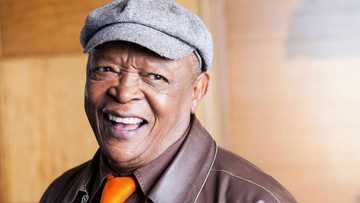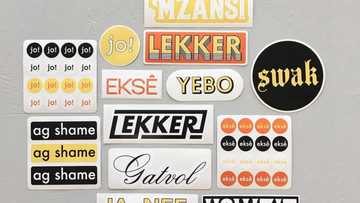How to say thank you in South African languages: Xhosa, Zulu, Tsonga, Afrikaans
Like any African ethnic community, South African communities value courtesy during interactions. It transcends everyday greetings between different age groups to the tone and choice of words while communicating. So, knowing how to say thank you in South African languages is fundamental, especially if you intend to traverse the different regions in the country.
New feature: Check out news exactly for YOU ➡️ find “Recommended for you” block and enjoy!
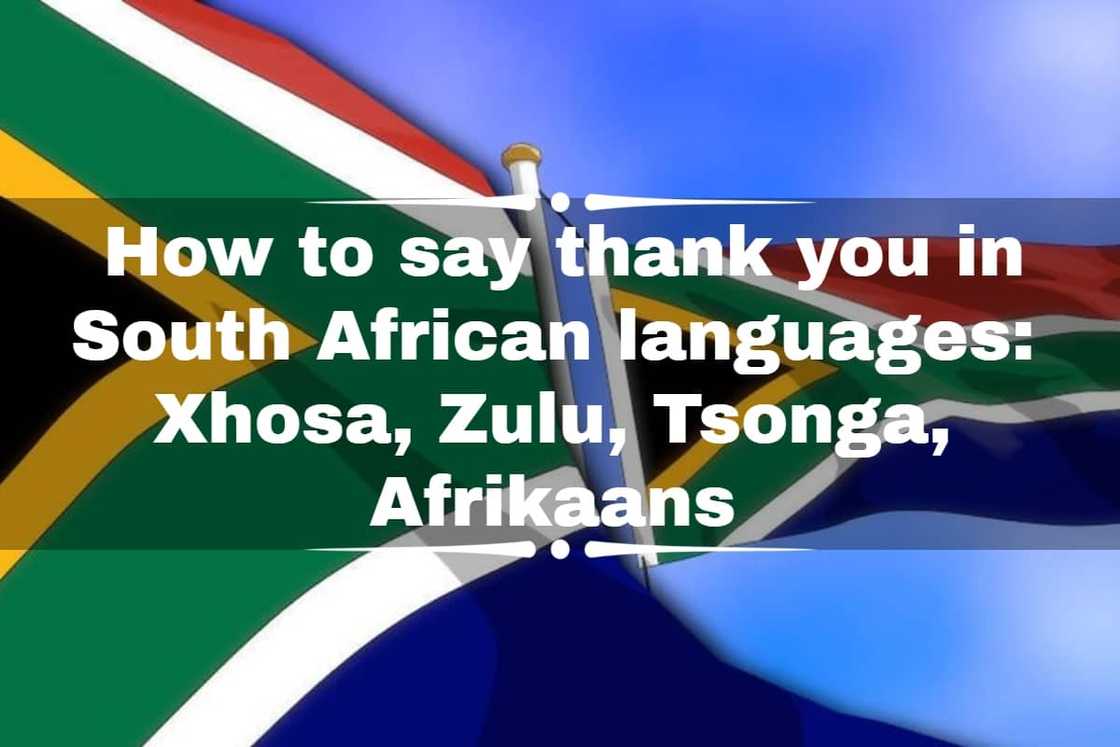
Source: UGC
Saying thank you is the simplest way of expressing gratitude. It is a sign of peace and also shows respect. Ending a conversation by expressing gratitude boosts the other party's self-esteem and confidence and affirms that they have done something important for you. So, this article intends to walk you through the different ways on how to say thank you in South African languages.
What are the 11 languages in South Africa?
Before getting into details about expressing gratitude, how about jogging your mind about the country's languages? They include:

Read also
Zimbabwean Embassy has laid a complaint over Limpopo Health MEC Dr Phophi Ramathuba’s comments
- Zulu
- Ndebele
- Afrikaans
- Xhosa
- Venda
- Shona
- Sesotho sa Leboa
- Sesotho
- Swati
- Tsonga
- Setswana
PAY ATTENTION: Follow Briefly News on Twitter and never miss the hottest topics! Find us at @brieflyza!
Thank you in all South African languages
How do you say thank you in 11 official languages in South Africa? South Africa has 11 distinct official tribes, and the country's constitution grants each of them equal status. Members of these tribes co-exist and take pride in their languages. Often, they throw a word or two in their local dialect during conversations and can communicate effectively. So, do not find it odd when this happens.
So, go through these details for more information on how to say thank you in all South African languages.
1. Thank you in Zulu – Ngiyabonga
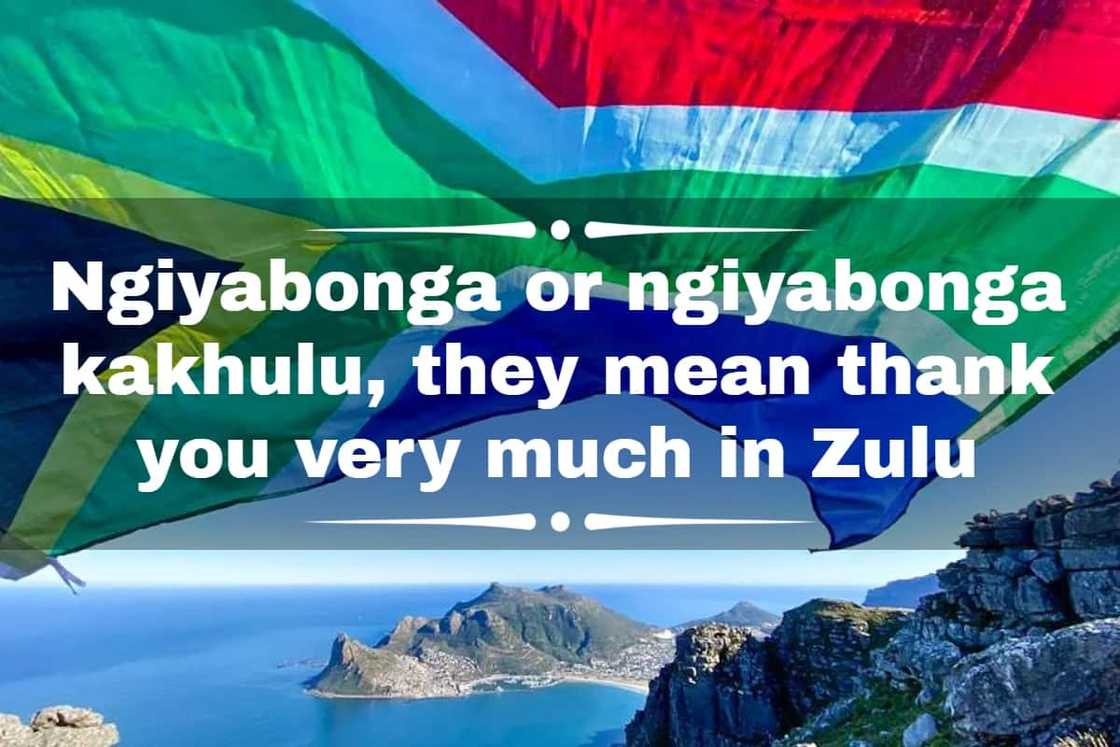
Source: UGC
Zulu is a Southern Bantu language and is one of the most spoken languages in South Africa.
In Zulu, when someone says ngiyabonga or ngiyabonga kakhulu, they mean thank you very much. When someone tells you ngiyabonga, your response is kulungile.
2. Thank you in Ndebele – Ngiyabonga
Ndebele is an interesting South African language since it uses clicks for consonants. Ndebele speakers are predominant in Cape Town, although they are also popular along the Southeastern coast. Saying ngiyabonga is an expression of gratitude, and the other party responds by saying kulungile.
3. Thank you in Afrikaans – Dankie
Afrikaans is the third most widely spoken language in South Africa. It came into existence during the colonization period. Saying dankie is an expression of gratitude in Afrikaans, and its response is nie te dankie, meaning you are welcome.
4. Thank you in Xhosa – Ndiyabulela or Enkosi
Xhosa is a Bantu language spoken by South Africans living in the Western Cape, Eastern Cape, Northern Cape or Free State in South Africa. People in Botswana and Lesotho also speak the language.
In Xhosa, ndiyabulela or enkosi means thank you, and your response in Xhosa should be wamkekekile. Alternatively, you could say ndiyabulela kakhulu to mean thank you very much. The response to this is nam ndiyabulela, which means you are welcome.
5. Thank you in Venda – Ndi a livhuwa or ro a livhuma
Venda, also known as Tshivenda, is another Bantu language in South Africa. Venda speakers are predominant in Johannesburg and the far northeastern part of South Africa. How do you say thank you in Venda? Just say ndi a livhuwa or ro a livhuma.
6. Thank you in Shona – Wazviita
The Shona language is originally from Zimbabwe, although most of its speakers are in Southern African countries like Mozambique, Botswana and Zambia. Wazviita is the language's expression of gratitude.
7. Thank you in Sesotho sa Leboa – Ke a leboga or re a leboga
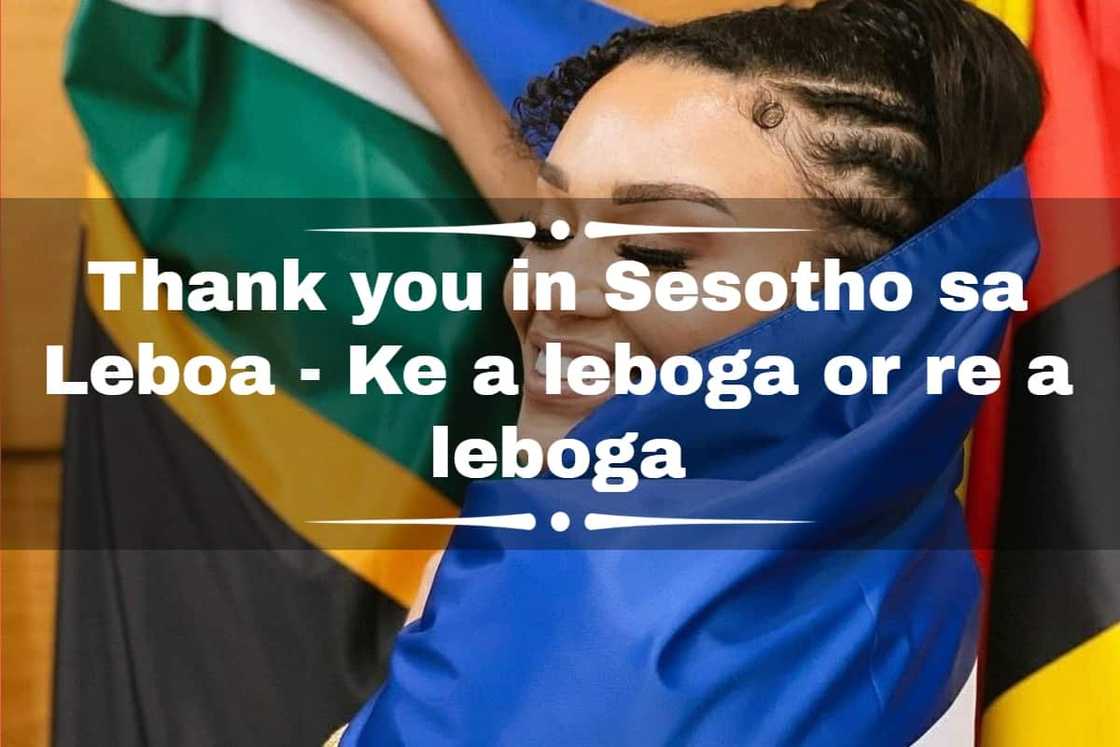
Source: UGC
Sesotho sa Leboa is a South African language spoken predominantly in Northern Sotho. Ke a leboga or re a leboga is the language's way of expressing gratitude.
8. Thank you in Tsonga – Ndzi khense ngopfu
Tsonga is a minor tribe in South Africa. It is spoken by people living along the border of Mozambique and South Africa. How do you say thank you in Tsonga? Saying Ndzi khense ngopfu shows appreciation for a deed done.
9. Thank you in Sesotho – Ke a laboha or ke a laboho haholo
Sesotho people of South Africa are also known as the Southern Sotho. Saying ke a laboha or ke a laboho haholo is a show of gratitude in the language, and its response is o amohetswe, meaning you are welcome.
10. Thank you in Swati – Ngiyabonga ngiyabonga kakhulu or ngiyakhona ngiyabonga
Swati, also known as siSwati or Swazi, is a language spoken mainly by South Africans in Northeast South Africa. Ngiyabonga ngiyabonga kakhulu or ngiyakhona ngiyabonga expresses gratitude in the language.
11. Thank you in Setswana
Setswana, also called Tswana, is a Bantu language spoken by South Africans in the country's Northeastern regions. These are the different ways of expressing gratitude in Setswana:
- Ke a leboga rra, from male to male.
- Ke a leboga mma, from male to female.
- Ke itumetse rra, from male to male.
- Ke itumetse mma, from male to female.
The responses to you will expect in either case could be:
- Ke itumetse rra, from male to male.
- Ke itumetse mma from male to female.
If you are a foreigner or a South African looking forward to travelling to the country's different regions, these details on how to say thank you in South African languages are essential.
READ ALSO: Basic Venda words and meanings that you ought to know | Useful phrases
Briefly.co.za published helpful details about basic Venda words and meanings you ought to know.
Tshivenda is considered one of the most complicated South African languages because it is challenging to learn. However, that is a relative statement since learning basic Venda words and meanings could significantly lessen the burden of paying a translator.
New feature: check out news exactly for YOU ➡️ find "Recommended for you" block and enjoy!
Source: Briefly News


